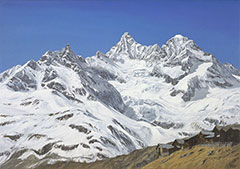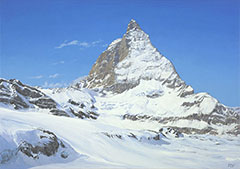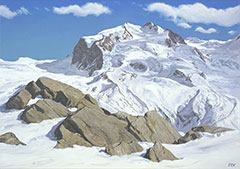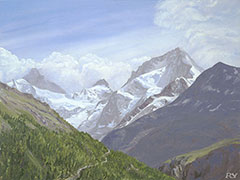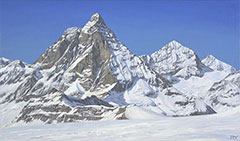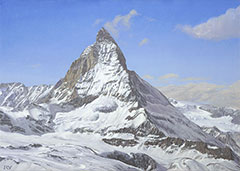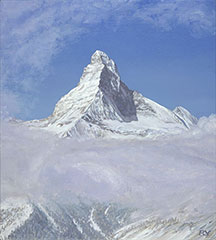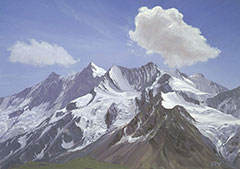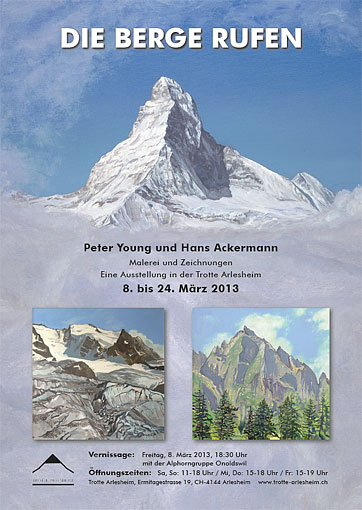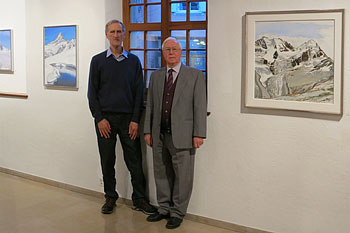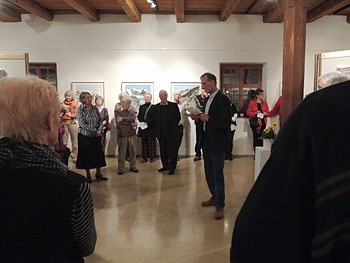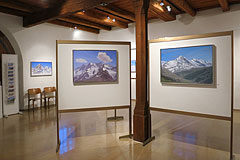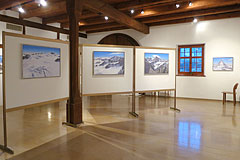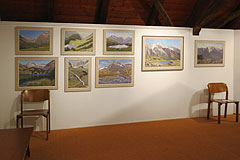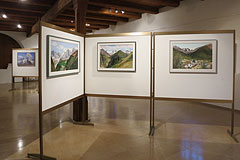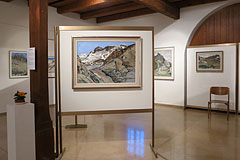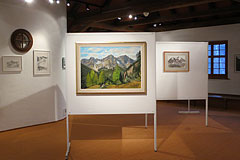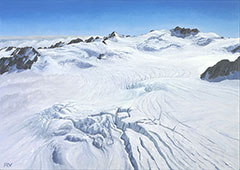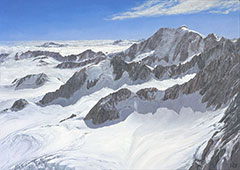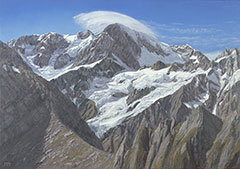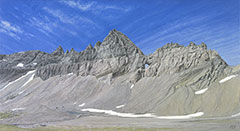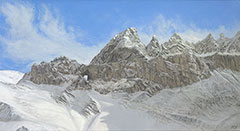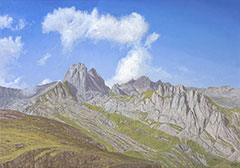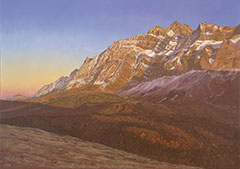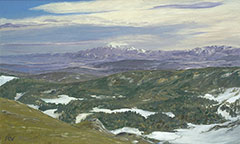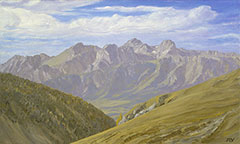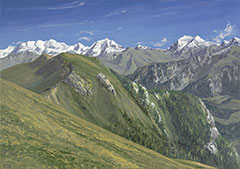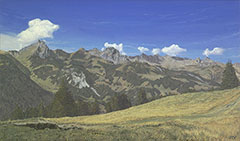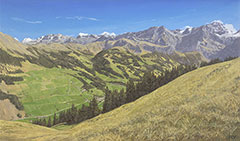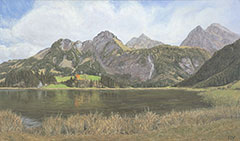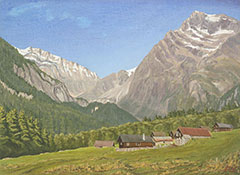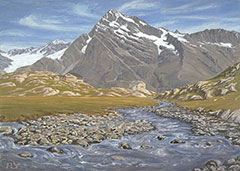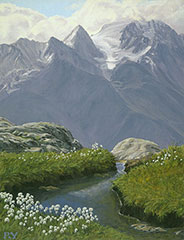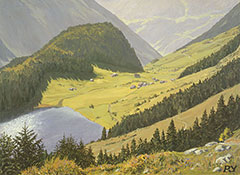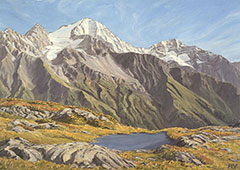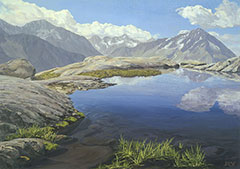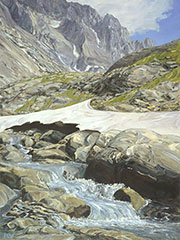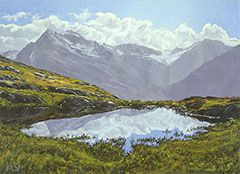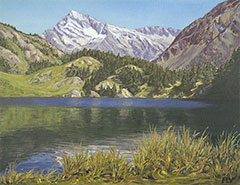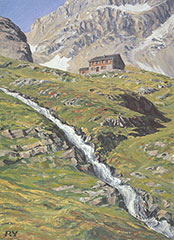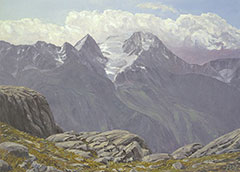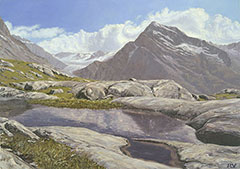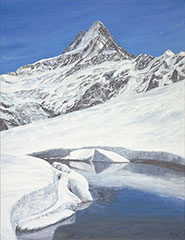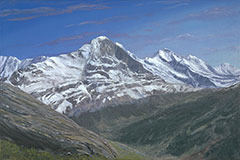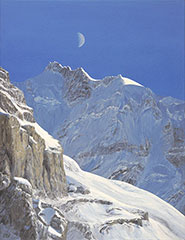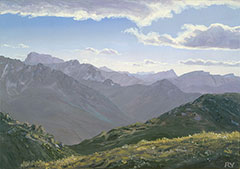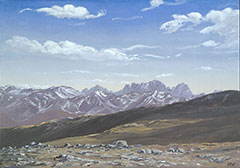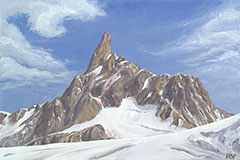 Peter Young
Peter Young
Exhibition in Arlesheim, 2013
<< Exhibitions
Exhibition of Mountain Paintings in Arlesheim, 2013
Hans Ackermann (Riehen) and I exhibited 90 paintings and drawings in the Trotte Museum, Arlesheim in March 2013.
Here's an overview of some of the works we showed (mine above, Hans' below).
My own works were grouped thematically, based on the geographic area of the subjects.
For a larger view and full details of each painting, click on the thumbnails below.
The Valaisian Fourthousanders
Nowhere in the Alps are so many 4000-ers so close together as in the Canton Valais, especially in the Zermatt Valley with the legendary Matterhorn at its head.
For over 150 years since it was first climbed, it has attracted artists, climbers and tourists from all over the world.
From whichever angle you see it, it stands there monumental, breathtaking, unforgettable.
But the neighbouring peaks are spectacular too, each with its own character and just as fascinating to the mountain painter.
The New Zealand Glaciers
The Southern Alps on the South Island of New Zealand may extend only one third as far (150 km) as the Alps of Europe, but they are certainly impressive, with their 120 peaks and over 3000 glaciers.
The highest mountain, Aoraki (Mount Cook) doesn't quite reach 4000 meters but with its feet at sea level and exposed to the continual storms of the Roaring Forties, it receives enormous amounts of snow which feed the many glaciers around it.
There are no mountain railways or chairlifts; but by helicopter you can enjoy a splendid overview of the magnificent, unspoilt mountain scenery.
Around the Martinsloch
In the north ridge of the Tschingelhorn, on the border between Cantons Glarus and Grisons, there's a famous hole.
From the western side, it is well-known because of the natural spectacle in spring and autumn, when the rays of the rising sun beam through the hole and strike the church tower of Elm in the valley below.
From the eastern side, the Martinsloch, as the hole is called, became famous in scientific circles after Hans Conrad Escher showed that the upper layer of rock is much older than that below, and painted a celebrated watercolour in July 1812.
The attempts to explain how this came about had a major impact on the new science of geology, paving the way for the theory of Plate Tectonics.
Reason enough, following the listing of the Sardona Tectonic Arena as a UNESCO World Heritage Area in 2008, and 200 years after Escher's painting, to revisit the scene and portray it again.
As one of the invited artists, I was able to exhibit these two works in Elm and Näfels between November and February 2013.
See also: Exhibition in Elm 2012
Alpstein
The northernmost bastion of the Swiss Alps, a limestone massiv with rugged cliffs and deep-cut valleys, is all the more impressive by contrast with the surrounding hills and farmland of Appenzell.
In its outlying position, well visible from afar, the Alpstein group, with Säntis, Altmann and the Wildhauser Schafberg, is a popular hiking area offering outstanding views of the underlying geological structure.
Western Bernese Oberland
West of the Jungfrau there are no more 4000-ers in the Bernese Alps, but altitude is not the only measure of beauty in the mountains.
The further west you go, the better you can appreciate how the individual peaks belong together as a single mountain chain.
An area more for walkers than serious climbers, from the intermediate heights you can enjoy panoramic views in all directions;
as in the Saanenland near Gstaad from the Hohe Wispile, with the picturesque Lauenensee nestling at its feet.
One day in the Maderanertal
High above the main axis of the Gotthard Pass is a side valley, where time has stood still.
The postbus takes you to Bristen but beyond there you have to walk; to the Golzernsee, to the venerable old hotel "Zum SAC" on the Balmenegg or further up to the Windgällen SAC hut.
It was a golden autumn weekend when we went up and stayed overnight.
Wandering over the slopes above the hut, between rocky outcrops, rushing streams and bright-eyed mountain tarns, I was able to gather in one day the material for these 12 paintings, which were exhibited together for the first time.
darüberhinaus ...
And so the mountains go on, leading ever further: from Grindelwald with the Schreckhorn and Eiger, through East-Tyrol with views towards the Dolomites, to Mont Blanc and beyond.
Watch this space ... there's more to come!
